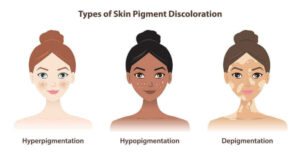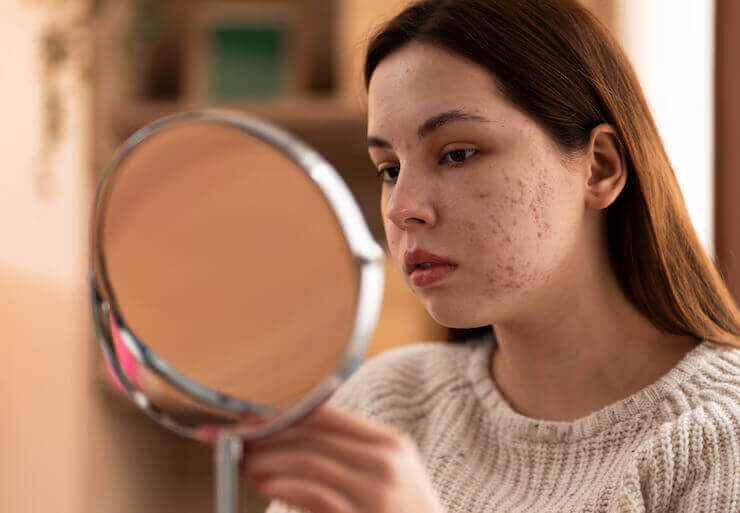What is Pigmentation?
Pigmentation occurs when melanin, produced by cells known as melanocytes, accumulates in certain areas of the skin. Melanin is a natural pigment that protects the skin from the sun’s ultraviolet (UV) rays. While melanin provides protection and color, its uneven distribution can lead to pigmentation issues.
There are various types of pigmentation disorders, including:
- Hyperpigmentation: This is when excess melanin causes darker patches or spots on the skin. Common forms include age spots, melasma, and post-inflammatory hyperpigmentation.
- Hypopigmentation: This occurs when there is a deficiency of melanin, leading to lighter patches of skin. Conditions like vitiligo and albinism are examples.
- Melasma: Often related to hormonal changes, melasma causes dark patches, usually on the face, and is commonly observed in pregnant women or those taking hormonal medications.
- Sunspots: Caused by prolonged exposure to UV light, these are often seen as dark spots on sun-exposed areas of the skin.

Causes of Pigmentation
Pigmentation changes can arise from a variety of factors:
- Sun Exposure: The most common cause of increased pigmentation, as UV rays stimulate melanin production to protect the skin.
- Hormonal Changes: Pregnancy, birth control pills, and hormone replacement therapy can trigger melasma.
- Inflammation and Injury: Skin trauma, such as acne or burns, can lead to post-inflammatory hyperpigmentation.
- Genetics: Some pigmentation issues, like vitiligo, are hereditary.
How Pigmentation Affects Your Skin
Pigmentation can have several effects on your skin, ranging from cosmetic concerns to emotional impacts:
- Aesthetic Changes: Uneven skin tone, dark spots, and patches can affect the overall appearance of the skin. This can sometimes lead to a lack of confidence or self-esteem issues.
- Skin Health: While pigmentation itself isn’t typically harmful, underlying conditions that cause it may affect skin health. For example, persistent inflammation from acne can exacerbate pigmentation issues.
- Sun Sensitivity: Areas of hyperpigmentation can be more sensitive to sun exposure, leading to further darkening if not properly protected.
Treatment Options at Reflection Facethetics Clinic
Addressing pigmentation issues requires a tailored approach, and this is where the expertise of Dr. Deepika at Reflection Facethetics Clinic shines. The clinic offers a range of Pigmentation treatments designed to correct irregularities and enhance skin health:
- Laser Therapy: Laser treatments can target melanin in specific areas, breaking it down and allowing the body to naturally remove it. This is effective for treating sunspots, age spots, and melasma.
- Chemical Peels: These involve applying a chemical peel solution to the skin to exfoliate and remove damaged layers, promoting the growth of new, evenly pigmented skin.
- Topical Treatments: Prescribed creams containing ingredients like hydroquinone, retinoids, and vitamin C can help lighten dark spots and even out skin tone.
- Microneedling: This procedure uses fine needles to create micro-injuries in the skin, stimulating collagen production and improving the appearance of pigmentation and texture.
- Personalized Skincare Plans: Dr. Deepika and her team create customized skincare regimens to address individual needs, incorporating advanced formulations and techniques for optimal results.
Preventing Pigmentation
Preventing pigmentation issues involves a combination of sun protection and skincare practices:
- Use Sunscreen: Apply a broad-spectrum sunscreen with at least SPF 30 daily, even on cloudy days, to protect against UV damage.
- Avoid Direct Sun Exposure: Limit time in the sun, especially during peak hours, and seek shade whenever possible.
- Skincare Routine: Use products that help regulate melanin production and support skin repair, such as those with antioxidants and exfoliants.
Conclusion
Pigmentation issues can significantly impact the appearance and health of your skin, but with the right treatment and preventive measures, they can be effectively managed. At Reflection Facethetics Clinic in Bangalore, Dr. Deepika offers comprehensive solutions tailored to each patient’s unique needs, ensuring a personalized approach to achieving a clearer, more even complexion.
If you’re struggling with pigmentation concerns and want to explore effective treatment options. Book your appointment now at Reflection Facethetics Clinic and take the first step toward revitalizing your skin’s appearance.



